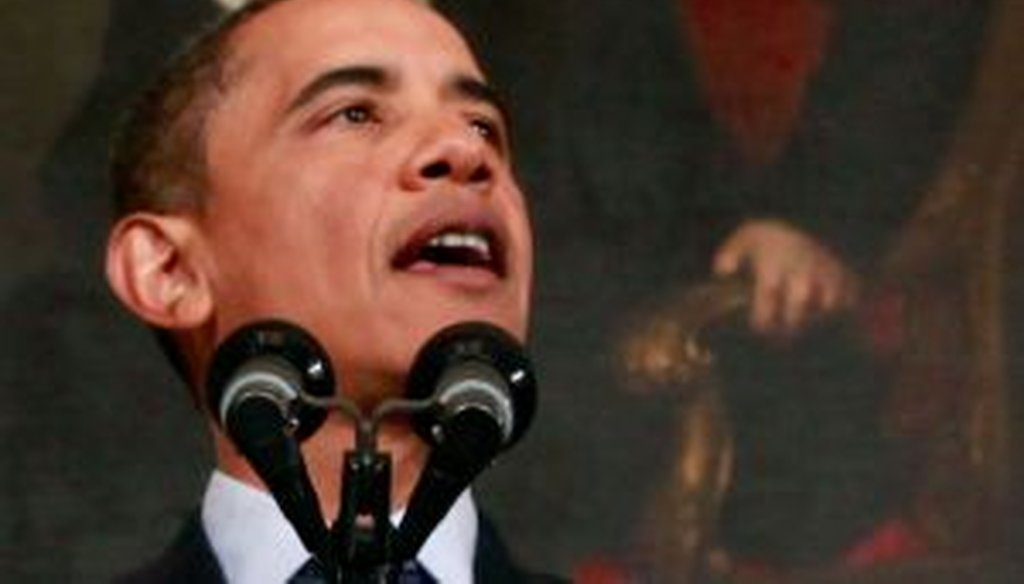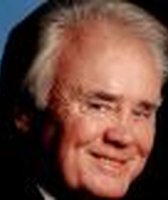Stand up for the facts!
Our only agenda is to publish the truth so you can be an informed participant in democracy.
We need your help.
I would like to contribute

One year into his presidency, Barack Obama still has a long to-do list.
President Barack Obama, the candidate who promised change, has made substantial progress in his first year in office, but some of his proposals have stalled as he struggled with the cold reality of Washington.
Of 502 campaign promises, a PolitiFact analysis finds Obama has fulfilled 91 and achieved at least partial success with another 33. More than half of his promises have had enough progress to be rated In the Works.
He's put much of his foreign policy agenda into action, taken steps to reduce the American presence in Iraq and send more troops to Afghanistan, and his sweeping health care reform plan is on the brink of passage. The giant economic stimulus bill that passed in February made good on a host of promises on green energy, education and transportation.
Yet Obama has found change can come slowly, even with his party in control of Congress. Overall, PolitiFact's Obameter has rated 14 promises as Broken and another 87 Stalled.
He's faced virtually unanimous opposition from Republicans on the stimulus and health care, and some of his promises for more transparency in government have gone nowhere.
In many cases, the Stalled or Broken ratings reflect tactical decisions by the White House. Obama said repeatedly during the campaign that he'd open health care negotiations to TV cameras, but those talks have been behind closed doors. He's done nothing on his pledge to allow the importation of prescription drugs from Canada since drug companies agreed to support his health care plan. And he appears to have abandoned a promise to end taxes for seniors who make less than $50,000, a proposal that appealed to older voters but had little political support, even within his party.
Still, the ratings show Obama — with the help of a Democratic Congress — has made significant progress on much of his agenda. Political experts give him credit for passing a substantial amount during the worst economic downturn since the Great Depression.
The bad economy may have dimmed public perceptions of his accomplishments, said Thomas Mann, a senior fellow at the Brookings Institution who studies the federal government. Obama's approval ratings dropped as 2009 came to an end.
"He's been largely faithful to the promises he made in the campaign, especially substantive policy ones," Mann said. "But the public doesn't see what I see in objective terms. There's distrust about the economy, and they're put off by the partisan bickering in Washington. They're scared and skeptical of government, so there's a gulf between what he's accomplished and how it's viewed."
Measuring progress
The Obameter database is an unprecedented effort to assess the new president's progress. PolitiFact reporters and editors compiled more than 500 promises from Obama's speeches, position papers, and interviews, and have been tracking and rating them over the past year.
To be included, a promise must have been made during the campaign. Pledges made after he took office, such as his one-year deadline to close the detention center at Guantanamo Bay, Cuba, are not counted. (That, editors decided, would essentially allow Obama to keep moving the goalposts.) To be included, the promises also had to be concrete enough to be measured. If a promise was too vague or abstract, we omitted it from the database.
Highlights of our analysis:
• Obama has made progress on nearly all 25 promises we selected as his most significant. Of our Top 25 list, two are rated Kept, three are Compromise, one is Stalled and one is Broken. The remaining 18 are In the Works, with some measurable progress.
• He got the low-hanging fruit. Many of the 90 promises rated Promise Kept are ones Obama could fulfill without Congress' approval, by issuing executive orders or directing executive agencies to launch initiatives.
• Several of his major legislative proposals have been delayed while Congress wrestled with the stimulus and health care reform. Our Stalled ratings include key proposals that Obama administration officials say they intend to tackle later: immigration reform, repealing the military "don't ask, don't tell" policy and repealing the Defense of Marriage Act.
• Obama fulfilled or made progress on two light-hearted promises in the Obameter database. He got his daughters a puppy and Congress has held hearings on creating a playoff system for college football.
Around the world
On foreign affairs and military strategy, Obama promised dramatic changes from Bush administration policies.
His most famous pledge was that he would begin removing combat brigades from Iraq, and that he would end the war "safely and responsibly" within 16 months. Indeed, just a month after taking office, Obama announced a new Iraq strategy that called for removal of all combat troops by Aug. 31, 2010 — a timeline he has stuck to since.
He also pledged to beef up military efforts in Afghanistan by sending two additional brigades. Obama issued an order to do just that last February and has since said he will send 30,000 more troops.
Obama also increased spending for military hardware and undertook a controversial review of weapons programs, which called for more investment in intelligence and surveillance and a halt to production of the F-22 Raptor and Marine One presidential helicopters.
Obama compromised on a promise to fully equip the reserves and National Guard. And his oft-repeated promise to repeal the "Don't Ask, Don't Tell" policy in the U.S. military has stalled.
As a candidate, he often talked about setting a new tone with foreign policy. Toward that goal, he took action on promises such as ending the use of torture and closing the Guantanamo Bay Detention Center, which we've rated In the Works. He kept his promise to give a speech at a major Islamic forum in the first 100 days of his presidency when he addressed the Turkish Parliament on April 6, 2009.
Obama won the Nobel Peace Prize in part because of his efforts to reduce the threat of nuclear weapons, but he's had mixed success in that area. He made progress on things he could do on his own, such as appointing the first White House Coordinator for Nuclear Security and organizing a conference to review the Nuclear Non-Proliferation Treaty.
But when he needed cooperation, the road has been rockier. Opposition from conservative senators could derail his plans to have the U.S. finally ratify the Comprehensive Nuclear Test Ban Treaty. His efforts to strengthen the non-proliferation treaty will likely face stiff resistance from Russia and China. Those promises are rated Stalled.
At home, a focus on green jobs, health care
Obama often linked energy and the environment during the campaign, promising a turn toward renewable energy.
He used the economic crisis to his advantage by packing the stimulus bill with incentives for renewable energy and green jobs. He used the bill to fulfill or make progress on his promises to weatherize low-income homes, boost state energy programs and encourage production of plug-in hybrid and electric cars.
Obama also used his regulatory power to advance environmental goals. In May, he announced plans to improve fuel efficiency standards, boosting the average by 5 percent annually. He also used regulations to increase the renewable fuels standard, requiring more biofuels to be mixed with gasoline. That effort is essentially building a market for renewable fuel, another goal.
A few promises have fizzled. Obama's pledge to enact a windfall profits tax on oil companies quietly disappeared after gasoline prices dropped in 2009. For the same reasons, Obama's promise to release oil from the Strategic Petroleum Reserve never came to pass.
On health care, his ambitious reform plan — it encompasses 35 promises in our Obameter database — has passed the House and Senate and is now in the final stages of negotiations.
Obama took a beating from liberals in his party because it's unlikely a government-run public option will be in the final plan. That promise is rated Stalled.
But in most other ways, the plan looks a lot like what Obama promised. It includes tax credits to individuals and small businesses who need help to buy insurance, a national health insurance exchange where consumers can shop for the best policy, and investments in electronic health records and new standards for health information technology. Many promises now rated In the Works could move to Promise Kept if the bill is enacted.
Behind closed doors
As a candidate, Obama talked about open government and transparency, vowing to open White House documents to the public and hold health care talks on C-SPAN. But as president, he's often succumbed to the traditions of Washington secrecy.
Several of his promises for a more open and transparent government have been rated Broken or Stalled. Obama said he would post legislation on the Internet for five days before he signed it, but that promise was broken almost immediately when Obama moved to quickly sign legislation on fair pay and children's health insurance. And, of course, health care negotiations haven't been on C-SPAN as promised either.
On the other hand, Obama created a National Declassification Center to get more information into the public domain, and he launched a major open government initiative specifically targeted at federal agencies.
Ellen Miller, executive director of the Sunlight Foundation, an open-government advocacy group, said the Obama administration has embraced an attitude of openness. A good example is Recovery.gov, the Web site that tracked spending from the stimulus package.
"This is the kind of a sea change we're asking them to do, a sea change in culture," Miller said.
Looking ahead
While we in the media love anniversaries — and you might, too, if you've read this far — presidential historians warn that the first year of a presidency is not necessarily indicative of future accomplishments.
"At the end of their first years, there are few people who would have predicted that Truman would be elected in 1948 or that Reagan would get a second term," said Robert Dallek, a presidential historian and author. "It's always premature to make some kind of categorical judgment after the first year in office."
And Obama has many unknowns ahead. One of the most daunting challenges will be reconciling spending with the growing public debt. The Bush administration tax cuts will expire this year, and Congress will have to pass new laws to avoid widespread tax hikes.
Obama has said repeatedly he won't ignore large deficits, but how he and Congress will approach fiscal matters remains to be seen. Obama's next budget is expected in a few weeks.
The long-term budget problems are significant, said Rudolph Penner, an economist and former head of the Congressional Budget Office.
The problem seems simple: The country spends more than it takes in from taxes.
But to keep people's taxes the same would require huge spending cuts that would be politically unpopular. "I don't think you could get five Republican votes for the kind of spending cuts you need," Penner said.
Conversely, failing to rein in spending would require unprecedented tax increases. "You'd have to raise taxes so much that we'd be one of the highest taxed countries in the world, and I don't see many liberals supporting that, either," he said.
The big-ticket items looming are programs for seniors, specifically Social Security and Medicare. But the large stimulus package and reduced tax revenues from the recession are making the budget outlook for future years even more gloomy.
The recession has "taken a lot of flexibility away from us, and it gives us less time to resolve these other problems," Penner said. "I'm very anxious to see the president's next budget."
Our Sources
See the Obameter.

















































